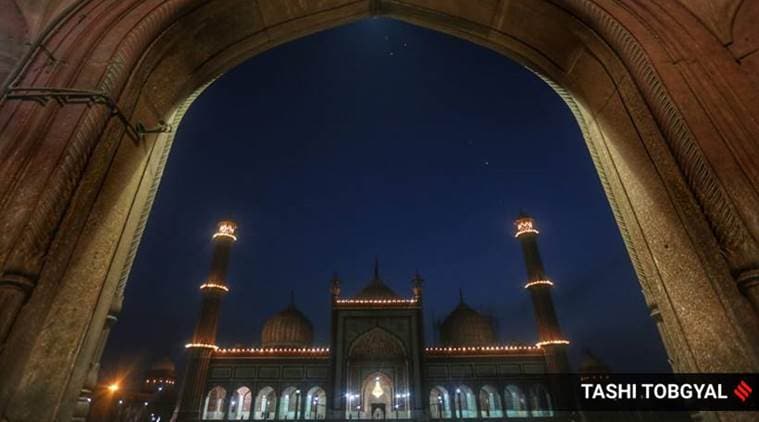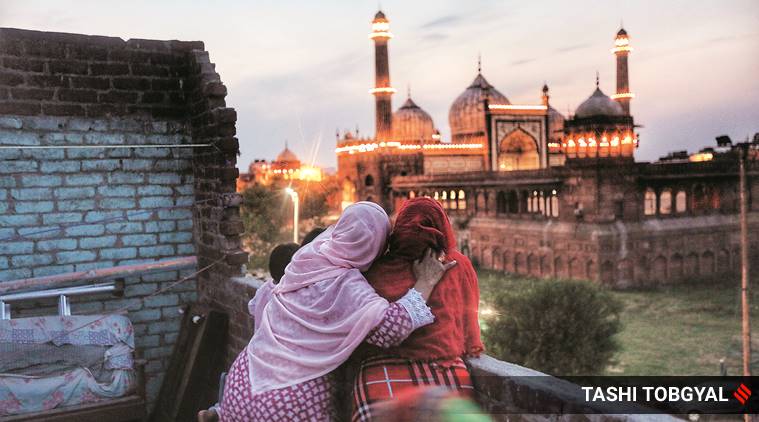 Typically, the month of Ramzan would witness packed mosques, jam-packed roads, food stalls buzzing with activities, and such. This year has been different. (Express Photo by Tashi Tobgyal)
Typically, the month of Ramzan would witness packed mosques, jam-packed roads, food stalls buzzing with activities, and such. This year has been different. (Express Photo by Tashi Tobgyal)
Somewhere in Chennai, as 27-year-old Neda Baig sits down after her evening prayer, there’s no haleem on the menu — not for the day, or the foreseeable future. She rues, as the delectable stew made of mutton was something she was looking forward to this Ramzan — just like she did every year. But this year has been different because of the pandemic. Around the world, as the Muslim community fasts and celebrates the holy month, there is also a lingering unease, because for the very first time, the iftaar — or the post-fast meal — is anything but a feast.
When we think of Ramzan, the mind conjures up the image of lip-smacking delicacies that are enjoyed by Muslims and non-Muslims alike. While people fast, they also look forward to the post-roza meal, which is cooked, bought, and shared with the less-privileged, too.
“We would always cook a little extra, so as to make offerings at the local mosque. But mosques are closed this time and, therefore, nothing elaborate is being prepared at my place,” says Baig, a fitness enthusiast and an NGO worker who is cooped up inside her house with her parents, her niece and her sister-in-law.
This year, the Baig family is instead improvising with aloo tikki and chickpeas. “I also miss the iftaar daawat, for which we would dress up and visit relatives, share laughter, food, and have a good time,” she says.
ALSO READ | Celebrate Ramadan with these delicious recipes
Lockdown has changed the concept of Ramzan
Just like Baig, Delhi-based Zeeshan Ali, a communications consultant, too, is missing all the food. But, most importantly, it is the kiwi fruit that he is missing the most. “I could not find it in my area at least; it seems the fruit has gone off the shelves,” he says. Until last year, Ali would break his fast, and then head to the mosque to offer special prayers called taraweeh. But this year, no such congregation is taking place, for obvious reasons.
“The quality of food has also been affected and the prices have skyrocketed, too. For those who are staying alone, they used to be, until last year, dependent on the eateries in the market. My friends would be eager to polish off a plate of haleem at the Jama Masjid or Chandni Chowk — all of these experiences are being missed this year,” he says, adding: “We all grew up with a certain understanding of what the month is all about. This year, however, it has changed drastically, and we are seeing it in a different light.”
Ali says while he is lucky that he is at least getting to observe the month and celebrate it with his family, it would have been better if they had more food options — like better quality fruits, juices and fresh meat. “A balanced diet full of proteins and other nutrients,” he says.
Ramzan without haleem?
It is beyond belief for many people that there will be no haleem on the plate this year. Not just Baig and Ali, but across the country, many families are managing without it. In fact, the Haleem Makers’ Association — of haleem making hotels and food joints in Hyderabad — has decided to not prepare the dish at all, to contain the spread of the infection. According to a report published in The News Minute, the unanimous decision was taken by its 400 members.
 Having friends and family over for iftaar get-togethers used to be commonplace, as were offering prayers together and distributing food packets to the needy. (Express Photo by Tashi Tobgyal)
Having friends and family over for iftaar get-togethers used to be commonplace, as were offering prayers together and distributing food packets to the needy. (Express Photo by Tashi Tobgyal)
Food, then and now
“We used to consume foods that are rich in protein, especially the older lot, because we would be fasting all day. There are some foods that are only eaten in Ramzan, which are not available this year. For example, my parents would have korma, or biryani, or any other heavy meal for dinner after breaking roza. This year, they are consuming more dal-sabzi instead . The younger lot, however, prefers pulses and vegetables, so there’s not much of a change there. But, the charm of the festival — the bustling markets, the meet and greets, etc. — is being missed. We cannot do anything about it, since we are in the middle of a pandemic, toh ek Ramzaan aisa bhi,” Abu Sufiyan, a marketing strategist and a resident of Old Delhi, says.
In the spirit of Ramzan
It’s a full house for Hasina Khatun, who is celebrating the festival with her father, mother, brother, nephews and niece in Delhi’s Karol Bagh. She says her family follows a schedule for the whole month. “I think it all differs from family to family. In our family, we eat rice because we are Bengali. In the evening, we have our qeema pakoras and egg pakoras. Until last year, my father would go to Chandni Chowk to get sheermaal or sweet bread. It cannot be made at home. He likes to eat food from outside, so he used to bring kebabs, too. This year, there is an unavailability of a lot of things, including mutton — so you cannot make a great many things at home,” she says.
For Khatun, however, the spirit of the fasting month is very much alive. “The current challenges have not really diminished the cheeriness. I think the fact that we are home is making us feel more relaxed and we are not losing our temper, either. Most people have gotten into a pattern. Mostly, the period is about acceptance and patience. And we are keeping that in mind,” she says.
Like never before
Typically, the month of Ramzan would witness packed mosques, jam-packed roads, food stalls buzzing with activities, and such. Having friends and family over for iftaar get-togethers were commonplace, as were offering prayers together and distributing food packets to the needy. Naureen Khan misses all this, especially because she is stuck in the Netherlands amid the global lockdown, away from her family in India.
The Communications Officer at the Coalition for the International Criminal Court, speaks to indianexpress.com from The Hague. “Usually I would be with my family this time, cooking, working, praying together. Family time is mostly what I crave for. Also the fact that I got married two months ago, and had planned to spend this time with my husband and my new family. It is heartbreaking,” she says.
Khan says her iftaar is super simple this year. “When you are home alone in lockdown, you try to make the best of what is available and, therefore, don’t really try fancy food. Even something as simple as pakoras or samosas is not something you try to attempt,” she laughs, adding: “I break my fast with dates, fruits and water, and then dive into simple home-cooked meals. Getting halal non-veg is also easy, as it is available in stores and I am lucky. This Ramadan, I am able to stay at home, for which I am grateful, because I can use the time to focus on my relationship with God. We can look at the positive side so as to lift our spirits. I know everyone is only praying for one thing right now — for the world to heal”.